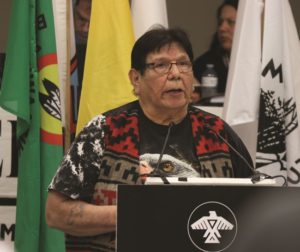Health Transformation will be developed by Anishinabek, for Anishinabek

By Marci Becking
CHIPPEWAS OF GEORGINA ISLAND FIRST NATION – A resolution was passed at the Anishinabek Nation Grand Council Assembly in Chippewas of Georgina Island First Nation that gives authority to the Health Department at the Anishinabek Nation head office to proceed with negotiations with Canada and Ontario in regards to asserting Anishinabek jurisdiction over health.
“Our people are tired of the way things are now with waiting for things such as eye glasses, braces and dialysis machines,” says Tom Bressette, champion for Health Transformation. “We need to do this for our people.”
The plan for Health Transformation will have no impact on the fiduciary duty of the Crown, no impact on Aboriginal Title Rights and Treaty Rights, and is without prejudice to any self-governing agreements or court proceedings.
First Nations health contribution agreements will be protected and enhanced. There will be an increased community-level flexibility in spending decisions to meet the First Nation’s needs and priorities.
Anishinabek Nation Health Director Jamie Restoule says that there are even more fiscal benefits.
“There will be higher escalators applied against the entire amount, simple process to carry unspent funds, and more efficiency,” says Restoule. “One-time only funding will be negotiated for infrastructure for new builds, major repairs and on-going increases to operations and maintenance.”
First Nations will be central to the design and delivery of health services at the community level.
“These health services will be coordinated with other community-based services. The First Nation will set the priorities for the community.”
The agreement will also acknowledge cultural knowledge, traditional practices and medicines as integral to the well-being of First Nations.
“It will acknowledge and act on the importance of community solutions and approaches,” adds Restoule.
First Nations and Inuit Health Branch and Ontario, in cooperation with First Nations, will continue to evolve from that of a designer and deliverer of First Nations health services to that of a funder and government partner.
“This will be devolution,” says Bressette. “It will devolve the delivery of programs to local levels as much as possible and when feasible and appropriate.”
Restoule says that the Anishinabek First Nation Health Authority (AFNHA) is the entity created by First Nations to accept transfer for health services and then transform them to meet First Nation’s needs.
“The Anishinabek First Nation Health Authority is not the Union of Ontario Indians,” says Restoule. “The Union of Ontario Indians is there to support the AFNHA as it is established as a Health Authority. Non-Anishinabek Nation communities are welcome to join the AFNHA.”
The AFNHA will be governed by the communities that have created the Authority.
“There are many benefits of Health Transformation,” says Restoule. “There are the benefits of being a larger organization with stronger and more powerful health advocates. An increased focus of health as a business. There will be better coordination and planning of infrastructure, housing and social services. Better access to specialized services such as epidemiology.”
Health Transformation will also produce more local and good paying jobs with benefits, an increased focus on health issues and health careers, service decisions will be made closer to the clients served and an integration of services will result in better services at a lower cost.
The Health Transformation team consists of Health Director Jamie Restoule, Fiscal consultant John Scherebnyj, champion Tom Bressette and administrative coordinator Jess Sandy.
Initial meetings have already started for Chippewas of Rama First Nation and Curve Lake First Nation.
For more information, contact Jess Sandy 705-497-9127 ext. 2231.


